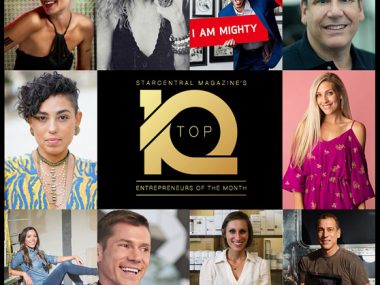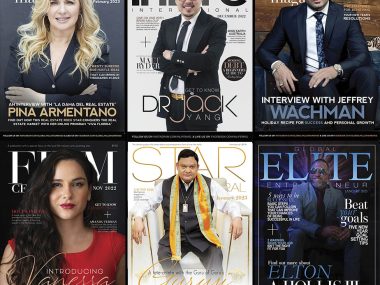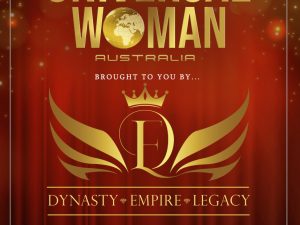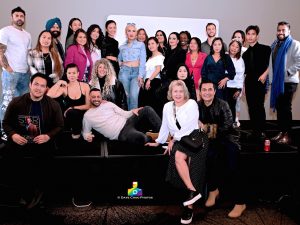Linwood Jackson Jr. is an author who writes about mental and spiritual health, and on its life-altering benefit. A few years ago, his life was turned upside down which actually kickstarted his career as an author. He was just graduating from college and experiencing a challenging season of life, causing him to look at the entire meaning of life. He went through an endless supply of philosophies for months, desperately hoping for answers but alas, all of his efforts were in vain. Eventually, though, his childhood memories of reading the Bible somehow began resurfacing and that’s when he decided that it was probably time to once again pick it up. From that day forward, everything he was searching for was made abundantly clear in ways he never could have imagined. And now, he feels that it’s his turn to share the same wisdom with others in any way he can.
Linwood Jackson Jr. is now someone who believes in the power of the Bible’s words when sincerely exercised and studied. All of his ambition for learning has come directly from the Bible. He has learned that every bit of the Bible’s instruction is relevant towards creating a more productive human being. He has dedicated his life to uncovering the true nature of the Bible’s philosophy and disproving the fallacies that exist surrounding it. With what he has uncovered, he wants to help develop a culture of personal investigation along with a practical application of spirituality according to the teachings of the Living God. Through his books, speeches, and discourses, he encourages everyone to think and feel for themselves so that self-love may bloom into self-possession through the knowledge acquired from experience.
StarCentral Magazine recently caught up with Linwood Jackson Jr. to discuss his journey as an author and here’s what went down:
Please tell us about yourself and how you got started writing your first novel.
The need for self-love, and direction on how to better treat myself and my life, was the basis for my first book. Passing through many internally testing experiences, I simply needed to better understand why I had no knowledge of how to respect my physical and inward person. I looked at different “philosophies of life” that are out there and found none that had as much value as the counsel in the Bible. I didn’t turn to the Christian religion for help, but simply to the words of the Bible for understanding. What I learned from the Bible absolutely changed how I thought and felt about life. What I found out about life, and about personal equilibrium through the Bible, became my first book, “Perfecting & Reforming Personal Religion.”
What is the most difficult part of your artistic process?
That’s a really interesting question. I’ve never quite thought about it, maybe because I see the most difficult part as being the most fun.
I would say the time I take, and the effort I put into understanding the Bible’s language and process. To honestly begin to understand any subject in the Bible, I look for the meaning of certain words either in Hebrew or in Greek, and from those words, I re-translate the words back into English for a more complete understanding of what I am reading. The process is looking at and comparing words and sentences in the Bible to arrive at the most suitable conclusion for the context of those words. This can be difficult because the research that is needed to understand even one word can be very tiresome, but when words and their context are understood, a better vision of what is being said appears, enlightening to the mind.
Do you try to be original or do you deliver to readers what they want?
My content, because it comes directly from the Bible, is content not fully meshing with a religion claiming to also be directly from the Bible. Maybe that’s odd to say, but the “religions of the Bible” don’t actually give what is in the Bible, but only their philosophical interpretation of what the Bible is saying based on the thoughts of theologians, and the religious traditions of theologians. In that sense, my content, although sounding familiar, is always original, because its vision isn’t filled with the holes a religion framed around the Bible would have. So, to be honest, no matter what I do, I can only be original. Because the content, language, and context of the Bible’s language is so foreign, a refreshing, genuine, and more thoughtful understanding from the traditional norm is what my readers will find.
If you could tell your younger writing self anything, what would it be?
I would definitely tell my younger self to stop believing that everyone who says they have your best interest actually has your best interest. I’ve come across, being absent-minded, and seeing only my passion, so many fake people who either only want your money or to make money off of your talent. I would take my younger self by the back of the head, bring him close to my eyes, and, looking into his eyes, I would say, “Stop being impatient and do what you can do, and reasonably, be your own PR manager. Put in the hard work. Make real connections with people who are actually concerned not only about you but also about your message and the people you hope to connect with. Learn who your “tribe” is. Don’t waste your money, but use the services of people who you know can and will love to support your brand.”
What is your writing Kryptonite?
So what can take my writing “superpowers” away from me? When I write, I keep my thoughts and my opinions away from theological theories, and away from the present and popular spiritual understanding. To mix these things with the knowledge I am personally uncovering from the Bible’s text would absolutely destroy what I am finding, because what is theological has nothing to do with what is in the Bible, but only with what some philosopher believes, without actual proof or certainty, the Bible is saying.
Other than that, I can only think of noise. If it isn’t the sound of the ocean crashing against itself or its bank, I need silence. There isn’t a more beautiful sound than silence.
What was the best money you ever spent as a writer?
All of the money I make from my books goes right back into my books. To me, that’s the best money spent, because the flow of money is taking care of itself.
What was an early experience where you learned that language had power?
That’s another good question. I would say that I began to learn the power and blessing behind words and language maybe five years ago. I used to freely give out these little newsletters of about fifteen pages through email. One day a woman came up to me, after receiving one, and asked where she could buy them. My thought was like if they are free, why would you even care whether or not they are sold anywhere, but it actually mattered to this woman. I asked her why she would want to buy something that is free, and she told me that the content was so potent that she wanted to support me. This scene in my life helped me to realize that words matter, and especially words that are helping people realize their personal value.
How many published and half-finished books do you have?
It’s as if you somehow know that the gold mine exists. I do currently have five books published, and one audiobook published. I actually am publishing a new book, a book of poetry, called “Growth,” by early to mid-August 2020. But I do have more finished, yet not completely edited books, than I do published books. I have so many books that are written that, when completely edited, will be published. These books are books on practical education, on law and religion, on the reality, and not the traditional understanding, of the man known as “Jesus,” on the difference between the Sabbath in the Bible and the sabbath celebrated by Christians, and other books with other relevant topics for today’s age of information and scientific philosophy.
Can you tell us something about your latest novel?
“Growth” is basically a book of poems about the struggle I observe between my self and my character. These poems sort of tell the story of the relationship between my self and my character, its ups and its down, to show the difficulty, and the need, behind making an effort to love who you are and are not, and to learn how your self and your character can have a happy and successful marriage.
What kind of research did you take for this book, and how long did you spend researching?
I actually began writing these poems more than three years ago. There are thirty-two poems in this book, and each poem recites an experience from that three-year journey. My learning of and proving the value behind the Bible’s philosophy of personal inward growth and development motivates the experience recorded in this book. My self, and my thoughts and my feelings became the lab-rat in this experiment, and as I put the Bible’s words to the test, feeling the conflict in adjusting my character to those words, that experience became my research.
What is the best advice you have ever been given?
A professor of “storytelling” once gave me the best advice I’ve ever heard: when it comes to writing, to whatever you are writing, always ask yourself, “Does it really say that? “
Whether writing fiction or non-fiction, language, and context matter. If you are writing fiction, you still need to be as true to the nature of your character as possible. You are creating a world and a character within a world, and you still need to make sure that what that world and character are, is exactly who and what that world and character are. Authenticity, even in fiction, validates the reality of what is created, and to bring such a philosophy into the world of non-fiction is to produce literature not only challenging the traditional norm but also encouraging other minds to begin to define their own “norm.”
What advice would you give to a newbie author who wants to make it in the industry?
My best advice would be to know your voice and to find the right publisher for that voice. It isn’t easy being a writer, and especially in this age where no one wants to read but to only “believe.” It takes more time for your “tribe” to trust you than it takes for you to locate them because they will find you, but it is a matter of patience and diligence on your part, to continue to make connections, to be seen, to be heard, and to create a platform, out of sheer will, for a sure legacy.
What are your future plans?
The goal, while continuing to publish, is to own my own publishing company. I have been thinking about this for some time, and, maybe sooner than I know, my publishing company will further the movement of the messages in my literature and discourses.












